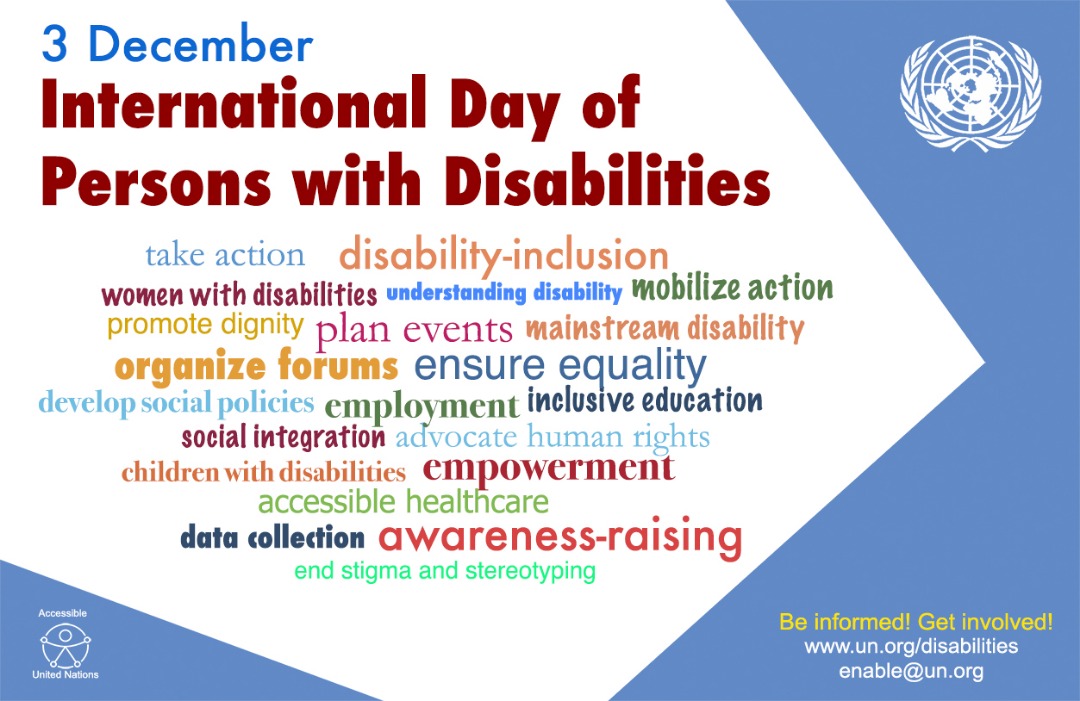DefendDefenders joins the world to celebrate the International Day of Persons with Disabilities. This year’s theme “leadership and participation of persons with disabilities toward an inclusive, accessible and sustainable post-COVID-19 world” underscores the importance of fostering an inclusive society.
To mark this year’s International Day of Persons with disabilities, DefendDefenders reflects on the situation of persons with disabilities (PWDs), including human rights defenders (HRDs) with disabilities living in conflict areas. Following research missions conducted this year in Ethiopia, Somalia, and South Sudan, we highlight challenges HRDs in conflict and humanitarian crises face and give recommendations on what needs to be done to ensure that they are included in humanitarian responses, decision making, and all aspects of society.
Based on our research findings, the challenges and barriers can be classified as either attitudinal, institutional, or environmental. PWDS experience stigma, prejudice, and discrimination from both state and non- state actors including from the communities they live in. Inaccessible environments create barriers to participation and inclusion, and poor road networks exacerbate injuries to the visually impaired. Public buildings, health facilities, government offices, roads, transportation, shops, and public transportation are all inaccessible to PWDs. Institutional barriers deny PWDs reasonable accommodation to participate in public and political life, education, health, recreation, and business.
PWDs, including HRDs living in conflict, face disproportionate challenges and obstacles. In Somalia specifically, 26% of the interviewed HRDs acquired their disability from the conflict. Our preliminary results found that PWDs, especially those with physical disabilities and visual impairment, face difficulties fleeing armed conflicts and were often left behind. Many fleeing conflict rely on assistance; for example, in Ethiopia, an HRD noted that they had to walk 50 kilometres to find refuge in the nearest town. However, they do not have the capabilities to do this, and so they remain behind. Some HRDs in Somalia noted that PWDs with hearing impairments and intellectual disabilities face additional risks in conflicts. They reported cases where the military shot people with hearing impairment for failing to stop at security checkpoints.
Additionally, HRDs with disabilities in Ethiopia, Somalia, and South Sudan noted that those left behind have no access to food or water. An HRD in Ethiopia noted PWDs were left in Tigray for three days without food or water. Furthermore, an HRD in Somalia noted that loud noises and explosions cause psychological harm for the visually impaired. They constantly live in fear and cannot determine where the danger is coming from.
Women and girls with disabilities in Ethiopia, Somalia, and South Sudan face intersectional discrimination, marginalisation, and stigma due to their disability and gender. HRDs consulted for the research reported that women and girls face additional social, cultural, economic, and political challenges compared to their male counterparts. During conflict, the prevalence of violence against women and girls, including women and girls with disabilities spikes. Women and girls with disabilities are disproportionately impacted by armed conflict and SGBV. One woman HRD recalled a case where a girl with a learning disability was raped repeatedly, and the perpetrator claimed it was consensual. He manipulated the girl to think they were playing a game, and the case was dropped.
PWDs are uniquely impacted by the Covid-19 pandemic, including health, education, and transport considerations. In addition, PWDs have a higher risk of contracting covid because the dissemination of information about the disease, including the symptoms and prevention, are not provided in accessible formats such as print materials in Braille, sign language interpretation, captions, audio provision, and graphics.
In addition, PWDs in Ethiopia, South Sudan, and Somalia face adverse socio economic outcomes, including; high poverty rates, fewer employment opportunities, low level of literacy, and poor health access. Additionally, HRDs interviewed from the three countries pointed out that inadequate social protection, healthcare benefits and family support, coupled with disability-related expenses, add layers to the vulnerabilities.
PWDs remain underrepresented in political processes and decision making in all three countries. All three countries lack specific litigation relating to the rights of persons with disabilities. In the cases where policies are developed, the governments lack the political will to implement the laws and policies. Moreover, women and girls with disabilities across the three countries have limited representation in mainstream women rights movements and disability rights movements. This impedes their opportunity to develop leadership capacity or speak on their rights.
Considering these preliminary findings,
- South Sudan should ratify the United Nations Convention on the Rights of Persons with Disabilities (UNCRPD) to guaranteed protection of PWDs.
- All African states should sign and ratify the Protocol to the African Charter on Human and Peoples’ Rights on the Rights of Persons with Disabilities in Africa.
- In line with this year’s theme, states should ensure PWDs have representation in all decision making bodies, especially in parliament.
- All stakeholders including states, civil society organisations, and humanitarian organisations should take appropriate and effective measures to ensure the protection and promotion of the rights and dignity of PWDs without discrimination based on disability.
For further information, please contact Estella Kabachwezi, Advocacy Research and Communications Manager on [email protected] or
Fatuma Hersi, Advocacy and Research Associate on [email protected]

